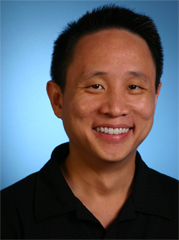|
Home | Biography | Sample Work | Screenplays | Our Role Models
Biography

Tony Lam is an
independent filmmaker, freelance producer-director, and screenwriter based in
L.A.
Tony recently directed VINCENT WHO?, a
documentary about the legacy of the Vincent Chin murder case, which
gave birth to the Asian American civil rights movement. Tony was
motivated to make this film, because after 25 years, the APA
community (not to mention the general public) still remains largely
ignorant of this momentous movement – momentous not only in Asian
American history, but also in American civil rights history.
As with VINCENT WHO?, Tony has largely dedicated his filmmaking and
freelance career to promoting Asian Americans and Asian American
stories. From 2006 to 2009, Tony produced the vignette series
OUR ROLE
MODELS for LA18, the largest Asian language TV station in the
U.S.
OUR ROLE MODELS featured outstanding Asians and Asian Americans who
have made an important difference in the community and beyond, from
celebrities like Justin Lin, David Henry Hwang, Dustin Nguyen and
Teddy Zee to
prominent leaders like John Chiang, Susan Ahn Cuddy and Michelle
Park-Steel to the many unsung heroes in the community.
In 2009, Tony directed a short documentary, HAMA, celebrating the 70th
birthday of Takeshi Hamagaki, a Japanese American who has greatly influenced American
jazz dance. In 2008, Tony produced a video highlighting the career
achievements of Ted Lieu, Charlie Woo, Julie Su, and Judge Robert
Kwan. In 2007, Tony produced videos celebrating an art exhibition by
international artist, Diana Shui-lu Wong, and promoting MIXED NUTZ,
a pioneering multicultural cartoon with Persian and Korean
characters. In 2006 and 2007, Tony served on the Mayor's Steering
Committee for Asian Pacific Islander American Heritage Month (APAHM),
and produced two APAHM public service announcements with Los Angeles
Mayor Antonio Villaraigosa. Through these and other Asian-themed
projects, Tony has interviewed and featured nearly 200 leaders and
talents in the APA community.
Tony has also honed his craft working on short films with Asian
American talent. He wrote, directed, and produced BIRTHDAY PARTY and
DING DONG. BIRTHDAY PARTY screened at the Los Angeles Asian Pacific
Film Festival and was singled out as a staff favorite. Tony has also
produced the short films, SAFE and 10,000 APOLOGIES TO MY ANCESTORS.
In addition, Tony has written several screenplays, including PABLO
NERUDA LEMONS, which won the Finalist Award at the Moondance
International Film Festival.
Tony graduated valedictorian of his high school and studied literature and history at Georgetown University, where
he graduated magna cum laude and Phi Beta Kappa with honors in both
majors. Tony has Masters degrees from Yale University (East Asian
Studies) and the University of Michigan (Asian History). He has
received over a dozen merit scholarships and awards, including the
internationally-prestigious Fulbright Scholarship, a full
scholarship at Yale, the Andrew W. Mellon Fellowship, and the
Foreign Language and Area Studies Fellowship (a rare three-time
recipient).
Tony is an avid traveler, who has visited many places around the
world, including living in Asia for several years.
While residing in Hong Kong in 1997 during the historic handover, Tony's life became the subject of a documentary called
MOVING POPULATION: NEW GOLD MOUNTAIN, produced by Radio Television
Hong Kong (RTHK), shot in three countries, and broadcast primetime
in Hong Kong, Southern China, and Macau. This fortuitous experience gave Tony
his first intimate exposure to media production.
As a child, Tony’s
parents could not afford him the luxury of many toys, so Tony amused
himself by prolifically writing short stories and plays, drawing
comic books, crafting all sorts of games, and creating elaborate,
character-driven fantasy worlds with his brother that existed only
in their shared imaginations. So while Tony grew up in a family of
modest means, he rarely felt deprived, because his restless
imagination kept him richly entertained.
Moreover, his parents gave him gifts worth far
more than toys. From his parents, Tony inherited a narrative
universe.
Often at the evening dinner table, amidst steaming bowls of rice,
Tony would listen to his father recite countless classical poems
from memory or tell riveting stories that lasted well past dessert.
His father depicted episodes from the Chinese classic, THE ROMANCE
OF THE THREE KINGDOMS, so vividly Tony could see the heroic battles
raging. At other times, his father recounted his own “Indiana Jones”
adventures through the turbulent, war-torn decades of twentieth-century China, such as the time when sea pirates attacked the
steamer he was on, and he stuffed his valuables into a banana to
prevent them from being taken.
Tony’s mother had her own stories to tell. She would recollect her
coming of age during the first Communist decade in China—the initial
excitement, the endless campaigns, and the pain of watching her
proud father persecuted and forced to sweep the streets. And she
would recall how for years she played the Communist stalwart, while
secretly planning her escape unbeknownst to even her own family.
Outwitting the
authorities, she ultimately made a harrowing escape to Hong Kong, hidden under the
planks of a fishing boat.
This environment of constant storytelling
formed the webwork of Tony’s childhood and fueled his imagination.
|
